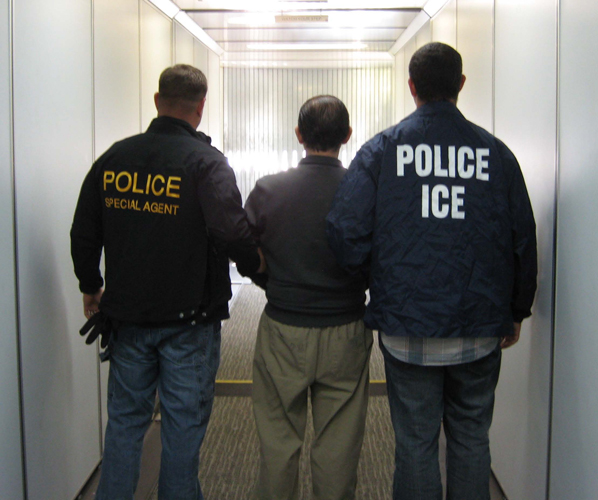Archived Content
In an effort to keep ICE.gov current, the archive contains content from a previous administration or is otherwise outdated. This information is archived and not reflective of current practice.
Peruvian Army major wanted for his participation in the death of 69 unarmed men, women and children extradited
LIMA, Peru — A former Peruvian Army major was successfully extradited from Miami to Lima, Peru, for his role in the 1985 murders of 69 unarmed men, women and children in Accomarca, located in the southern province of Ayacucho, Peru. He arrived at the Jorge Chávez International Airport on July 14, where he was placed in custody by the Peruvian National Police.
Telmo Ricardo Hurtado-Hurtado, 50, was wanted by Peruvian authorities for homicide stemming from his role in the "Accomarca Massacre." The extradition is the result of extensive investigative work conducted jointly by: U.S. Immigration and Customs Enforcement (ICE), Department of Justice, Department of State and Peruvian law enforcement authorities.
"It is ICE's responsibility to protect those who came to our shores seeking to escape those who perpetrated such atrocities," said ICE Director John Morton. "ICE uses every tool at our disposal to ensure that those who have committed such acts abroad never evade justice and accountability for their crimes by hiding among their victims in the United States."
In August 1985, while serving as a lieutenant in the Peruvian Army, Hurtado-Hurtado ordered soldiers under his command to gather and kill 69 men, women and children from a remote mountain village in Accomarca.
When word of this massacre become public and an investigation was undertaken, Hurtado-Hurtado personally led back a smaller group of soldiers and proceeded to kill seven additional people who either witnessed or survived the initial crime. In 1992, in Peru, he was sentenced to a term of six years in prison for abuse of authority in connection with the massacre. However, he was never jailed.
In 1995, he was pardoned as part of a larger grant of amnesty by the Peruvian government. In 2002, the Peruvian Supreme Court rescinded this amnesty grant after finding it to be unconstitutional. Following this development, he fled Peru. Hurtado-Hurtado entered the United States in 2002, but had his visa revoked the following year. In late 2006, ICE's Homeland Security Investigations (HSI) Human Rights Violators and War Crimes Unit initiated an investigation after receiving information from INTERPOL in Lima. Officials indicated Hurtado-Hurtado was involved in significant human rights violations and was possibly hiding in the United States.
On March 30, 2007, ICE HSI special agents arrested Hurtado-Hurtado in Miami Beach, Fla., on federal criminal charges. He was subsequently convicted in the U.S. District Court for the Southern District of Florida for visa fraud and making false statements on a visa application. He was sentenced to six months in federal prison.
On Sept. 3, 2008, the U.S. Marshals Service took Hurtado-Hurtado into custody pursuant to an arrest warrant after Peru requested his extradition on criminal charges of murder, abduction and forced disappearances. At a 2009 extradition hearing, a U.S. judge certified his extradition after finding probable cause to believe that Hurtado-Hurtado committed the offenses alleged in Peru's extradition request. After exhausting the appeals process, his stay of extradition was lifted on June 23, 2011, and final removal order was signed by the U.S. Secretary of State.
ICE had previously deported Juan Manuel Rivera-Rondon, a former Peruvian Army officer who participated in the massacre, to Peru. He was removed from the United States on June 30, 2008.
Identifying, investigating, and removing human rights violators and war criminals from the United States is one of ICE's top priorities. These individuals are alleged to have committed crimes ranging from religious persecution to genocide. The enforcement efforts targeting Hurtado-Hurtado and Rivera-Rondon were overseen by ICE's Human Rights Violators and War Crimes Center, in close collaboration with the agency's Human Rights Law Section.
Established in 2009 to further ICE efforts to identify, track and prosecute human rights abusers, the Center leverages the expertise of a select group of agents, lawyers, intelligence and research specialists, historians and analysts who direct the agency's broader enforcement efforts against these offenders — HSI's HRVWCC. Members of the public who have information about foreign nationals suspected of engaging in human rights abuses or war crimes are urged to call the ICE tip line at: 1-866-DHS-2423 (1-866-347-2423). Callers may remain anonymous. To learn more about the assistance available to victims in these cases, the public should contact ICE's confidential victim-witness toll-free number at: 1-866-872-4973.
Since fiscal year 2004, ICE has arrested more than 200 individuals for human rights-related violations of the law under various criminal and/or immigration statutes. During that same period, ICE obtained deportation orders for and physically removed more than 400 known or suspected human rights violators from the United States. ICE is pursuing more than 1,900 leads and removal cases involving suspected human rights violators from approximately 95 different countries. These cases are predominantly focused on Central and South America, Haiti, the former Yugoslavia and Africa. They represent cases in various stages of investigation, prosecution or removal proceedings.


